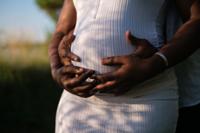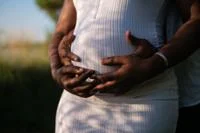Women4Change taps the next generation in work for improvements to women’s healthcare
- By Maggie McGuire, TheStatehouseFile.com
- Â
The Indiana Maternal Mortality Review Committee found that 79% of pregnancy-related deaths were preventable. In 2021, the infant mortality rate for Indiana was above the national average at 6.7%; the national average is 5.4%, which is similar to developing nation rates.

The causes of these deaths range from lack of access to medical attention to lack of housing to lack of mental health support. In response, a group of women came together seven years ago and decided they wanted to make a change for mothers and their babies.
They created Women4Change in the wake of the 2016 election, with maternal mortality as one of their causes. JoAnn Hoskins, Women4Change board chair, has been with the organization from the start. Their goals started small but have expanded as their cause has picked up attention.
“These are innocent lives being lost in the care of mothers and babies. Those deaths are completely preventable,†Hoskins said. “That should terrify everybody, frankly.â€
The group provides both civic and general education to all—women and men, Republicans and Democrats, elderly and students. The topics are addressed at events such as speeches and rallies as well as through newsletters and hearings on bills that directly impact maternal health care.
“First of all, the most important piece of this is that we have to learn to be civil with each other. Our whole goal is really to start educating people, and so we have a couple of things we really focus on,†Hoskins said.
2023 State of Women Conference
Each year, the organization partners with other groups—such as Lost Mothers and Navigate Maternity, both committed to improving maternal care—to put on the State of Women Conference. This year, the event was hosted on the IUPUI campus on Oct. 19. The event was sold out with 120 people attending, many of them college students.
“We want to learn from what has worked elsewhere to improve maternal health for all women, but especially for women of color who are much more likely to die during pregnancy and up to one year postpartum,†said Women4Change board co-chair Deborah Hern Smith in a press release.
The conference hosted three keynote speakers along with several break-out sessions. The first keynote topic covered the Lost Mothers program; the second was a woman who shared her story of almost dying during a high-risk pregnancy and how she has used that experience to create hope; the third was about how marginalized communities are more at risk and the lack of housing for all new mothers.
“We had great examples. The second keynote gave her talk as someone who nearly died in childbirth because they [the doctors at the ER] weren’t listening,†Hoskins said.
“We were all on the edge of our seats. [After she was done], they had a follow-up for women who had similar experiences. Immediately, four women ran right up there … That many women ran up there to say, ‘I have a story too; it’s not uncommon.’â€
That keynote speaker, Ariana McGee, used her experience to start putting together kits to help high-risk pregnancies monitor their vitals. The kit includes a scale to monitor water weight influxes, a blood pressure cuff, and a way to send the information to their doctor’s office. It is currently covered by Medicaid and Medicare. The project is named Navigate Maternity and focuses on all women but is available specifically to marginalized Americans.
“She says this is going to save lives, and there is no doubt about it,†Hoskins said.
Future generations
Seven years later, Women4Change is still developing the spread of their outreach. The group has started chapters on several college campuses. Specifically, IUPUI’s chapter has picked up in popularity. It was a driving force of the conference this year.
“We have planted a few other [chapters], but IUPUI is going gangbusters. They just do fantastic stuff. They have all kinds of activities, independent thoughts and ideas of things,†Hoskins said. “They lead the charge in putting together this conference. That’s why we had it on the IUPUI campus, so these young women could be a part of the process.â€
Many of the students involved have gone so far as to change their major to law or political science. Some have had internships with Indiana’s Women4Change or a hands-on role within their school’s chapter. Sophomore MaKayla Waugh is the current director of communication for the IUPUI chapter.
“Women4Change at IUPUI and Women4Change Indiana have impacted me as an epidemiology major, aspiring physician, and Hoosier woman to advocate for change for maternal and infant health, underrepresented communities, voting, and by understanding the social determinants of health, specifically in Indiana,†Waugh said.
Waugh was introduced to Women4Change during her freshman year at IUPUI. One of her biology professors serves on Indiana’s Women4Change board and is one of the advisors for the campus chapter. Waugh’s current role is to promote the organization and the events it is hosting through social media, branding and newsletters.
“I see this organization as one that will continue to thrive and build upon the work and success of previous women,†Waugh said. “We continue to advocate, educate, collaborate and activate members of our community to register to vote, use their voices, and aid their community through volunteering and advocacy.â€
Another project Women4Change will incorporate this upcoming year is voting parties, in the form of educational practice. Before primaries begin, the group will have specific days for people to do polling station activities. At each location, a crew will be set up to help people decide whether they will need a mail-in ballot or will be physically at the polls. From there, the individual will receive a checklist based on their decision. The next table helps register and/or order the ballot. Several more activities walk them through what to expect on voting day, and by the end, the individual knows what their voting plan is and how to follow through with it.
“The idea was that people might be intimidated by the voting process, that they don’t know how to vote, so they’re too embarrassed to say that, so they just don’t vote,†Hoskins said. “We gave them reassurance.â€
The group plans to continue improving old programs while simultaneously developing new ones. Education remains its core goal, and there is an understanding that new challenges may present themselves in the legislature.
“Like tomorrow we’re meeting with our whole group to start looking at the bills that are coming up in 2024,†Hoskins said. “I will tell you, 2024 is going to be our biggest effort. It has to be; we have to get young people involved.â€
FOOTNOTE: Editor’s note: This story was updated to correct JoAnn Hoskins’ title. She is the Women4Change board chair.






.
Speaking of women’s healthcare? Folks:
Current law says the Government can force a woman to have the child of a man who raped her. The woman has no choice, and no say, in the matter.
Did you know that?
Comments are closed.